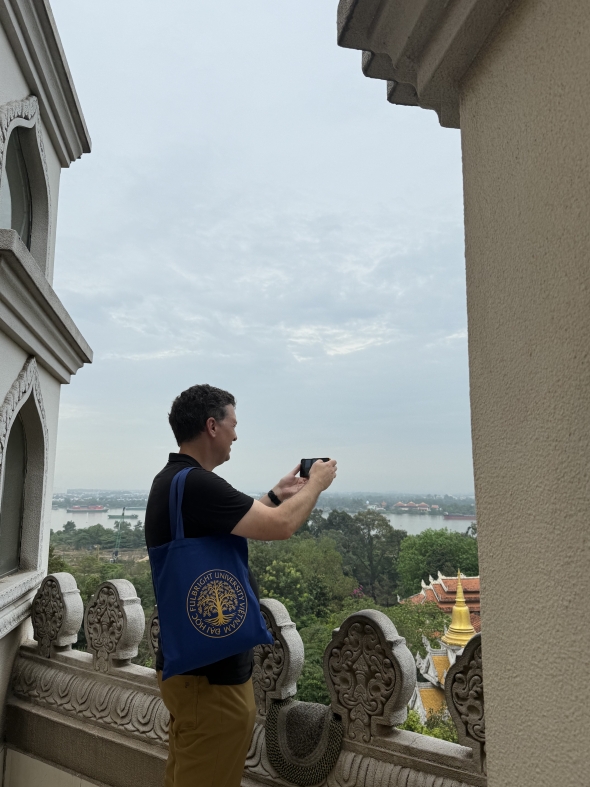
The Scholar, the Mentor, the Legend: Professor Edward Miller
As I wrap up my junior year at Dartmouth, I reflect on the whirlwind of academic interests I've had the opportunity to explore over the past few terms. From entering Dartmouth with initial interests in biology and the pre-health track to now—a history major modified with Asian studies—I feel incredibly fortunate to experience the changes I did and for the individuals I've met along the way in shaping my academic journey. One particular individual, Professor Edward Miller—who is an Associate Professor of History and Chair of the Asian Societies, Cultures, and Languages (ASCL) department—has been crucial to much of my intellectual development over my sophomore and junior years. He's not only brought my attention to an interest in Vietnam but also highlights the importance of the digital humanities field, which is currently under threat of being federally defunded, and gives meaning to the work and study I've chosen to engage in. A historian of the Vietnam War, modern Vietnam, and oral history—just a few highlights from his wide range of academic scholarship—this post is dedicated to the scholar, the mentor, and the living legend that Professor Miller is.
I first came across Professor Miller the summer after my first year while looking for research opportunities for the following academic year. I saw that he directed the Dartmouth Digital History Initiative (DDHI), a digital humanities project launched in 2019 that explores new ways of researching, analyzing, and visualizing oral history; I saw this as an opportunity to engage with the intersection between the rapidly evolving digitized world, historical archives, and storytelling. I joined the DDHI team my sophomore fall, working with Professor Miller, our project manager Mara, and the DDHI team—and have been working with them ever since. Last winter and spring, I worked on one of my favorite projects, which involved Dartmouth's Class of '64. As part of a larger National Endowment for the Humanities (NEH) funded initiative in collaboration with the University of Kentucky's Oral History Metadata Synchronizer, we built digital exhibits based upon Vietnam War era oral history interviews—conducted by the Dartmouth Vietnam Project (also founded by Professor Miller)—to be featured at the '64's 60th reunion gathering in June 2024. Currently, the DDHI is working on a multi-year project to open up a new avenue to studying Vietnam War history through a digital archive about the life and career of Pham Xuan An—considered the greatest spy of the Vietnam War—and a series of digital essays that may re-interpret intelligence history of the Vietnam War. As I recently completed the pilot phase of this project, I was involved in transcribing, editing, encoding, and auditing oral history interviews with An in order to develop a workflow that will inform the remainder of the project.
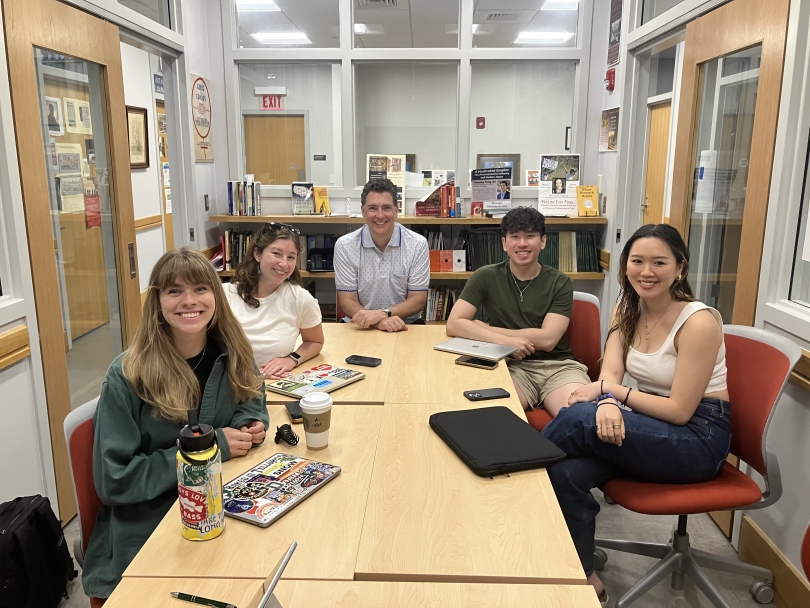
Last December, I completed the "Developing Vietnam" study abroad program (click here for my 2024 winterim photo journal), which is an intensive 3-week foreign study with the ASCL department—obviously led by none other than Professor Miller. As a fall term+ program supported by Guarini (Dartmouth's institute that directs our study abroad programs), Developing Vietnam is structured as a two-credit course over the course of the fall term and the first 3 weeks of our six-week winter break, also known as "winterim." The fall term class explores Vietnam's development since the Doi Moi reforms of the 1980s and also challenges conventional thinking of what development means through a historical, environmental, urban studies, and religious lens. In addition, we collaborate with students from Fulbright University Vietnam to plan and design a research project on any topic related to development we can explore while we are in Vietnam. The winterim class credit is based upon our time in Saigon/Ho Chi Minh City, Vietnam, where we conduct on-site fieldwork; project topics have ranged from exploring the semiconductor industry to Saigon's street coffee scene.
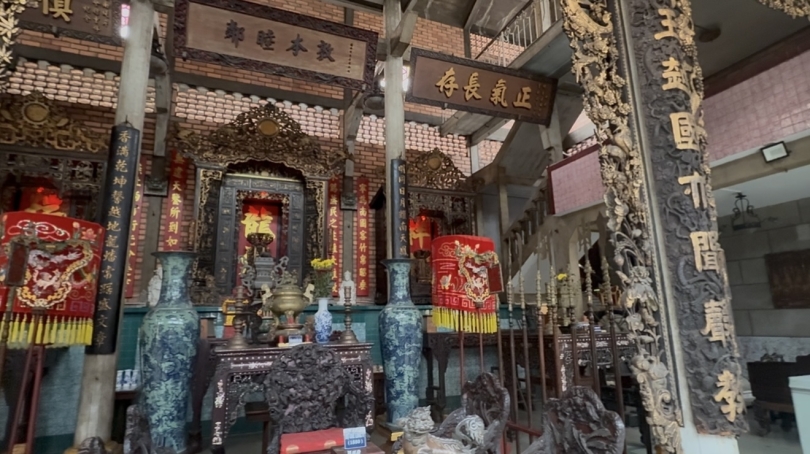
Furthermore, we also went on a multitude of class trips throughout South Vietnam, such as the Mekong Delta and a walking tour of Cholon, which is Saigon's Chinatown. The time spent studying and discussing Vietnam inside the classroom of Hanover, NH, to experiencing our readings in real life was by far, one of the most worthwhile and meaningful experiences from the winterim component. This study abroad also heavily emphasized the importance of intercultural development: the ability to shift and adapt to cultural perspectives different from your own experiences; working with my Fulbright teammates has been personally and professionally insightful as it taught me to approach others with greater empathy and understanding, a skill that I am working towards, and important in the international diplomacy and foreign service realm. There's so much more I can say about studying abroad in Vietnam, and I can type for pages about this experience, but to keep it (kinda) short: what an experience!
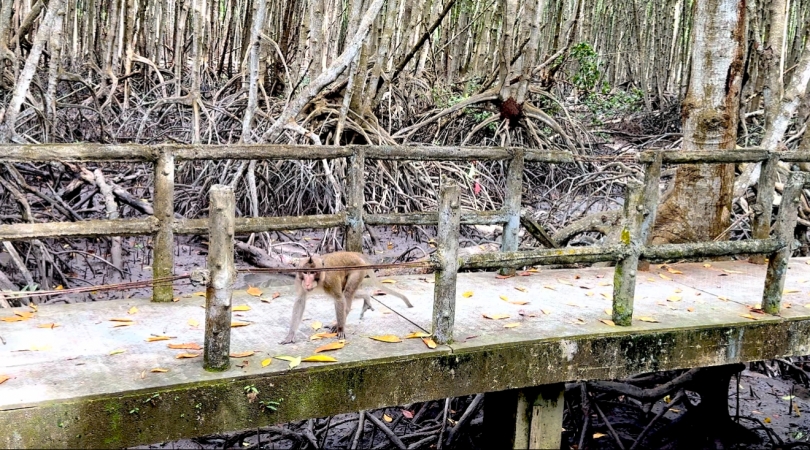
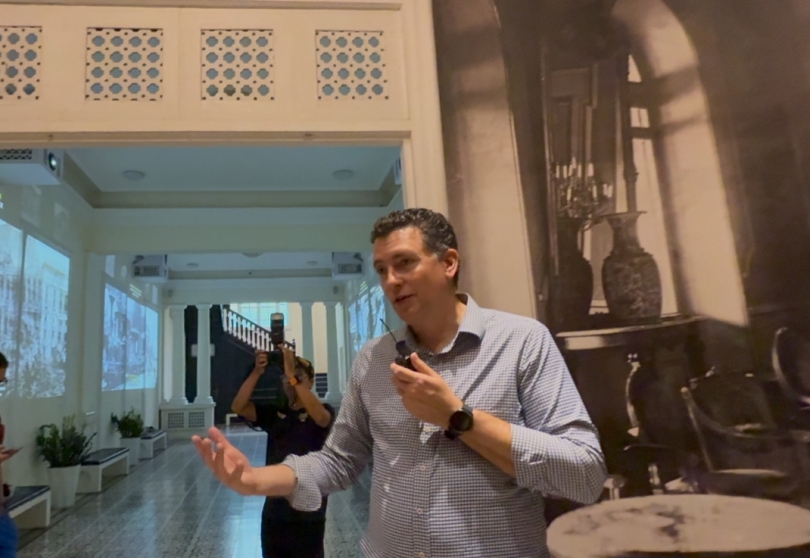
To complement this study abroad, I concurrently took Professor Miller's Vietnam War history course, also offered last fall, which was very vital to my comprehensive understanding of the country and the historical context leading up to reform in the late 20th century. Starting from pre-colonial Vietnam to examining post-war Vietnamese diasporic memories, this class particularly explored the role of violence, the decisions made by US and Vietnamese leaders, and the experiences of ordinary soldiers and civilians; we investigated multiple explanations of the war's origins and outcome. Furthermore, what makes Professor Miller's teaching so impactful—and integral to the study of Vietnam War history—is his engagement with both American and Vietnamese sources and perspectives; I was constantly challenged to think critically and closely about this major 20th-century historical event. Most recently, this past winter term, I took one (final?) class with him called The Dartmouth Vietnam Project, where we conducted oral history interviews with members in the Dartmouth and Upper Valley community who served in Vietnam or during the Vietnam War era; this class culminated with each student building a digital exhibition exploring themes or topics from their interview. I had the great fortune of interviewing Mr. Allan Campbell '64 for DVP and built my exhibition exploring the role of Naval junior officers and Officer Candidate School during the Vietnam War era.
In all, I think my greatest privilege at Dartmouth has been the opportunity to engage in the "scholars who teach" model. Through these experiences and opportunities, I've been able to shape my academic interests and passion that have guided me from the "I don't know what I want to do with my life" questions to providing a sense of clarity in my long-term goals. Professor Miller has made learning feel exciting, and embodies what a Dartmouth professor is; while there is still so much more to learn in this world, I know I don't want to stop learning from him.
